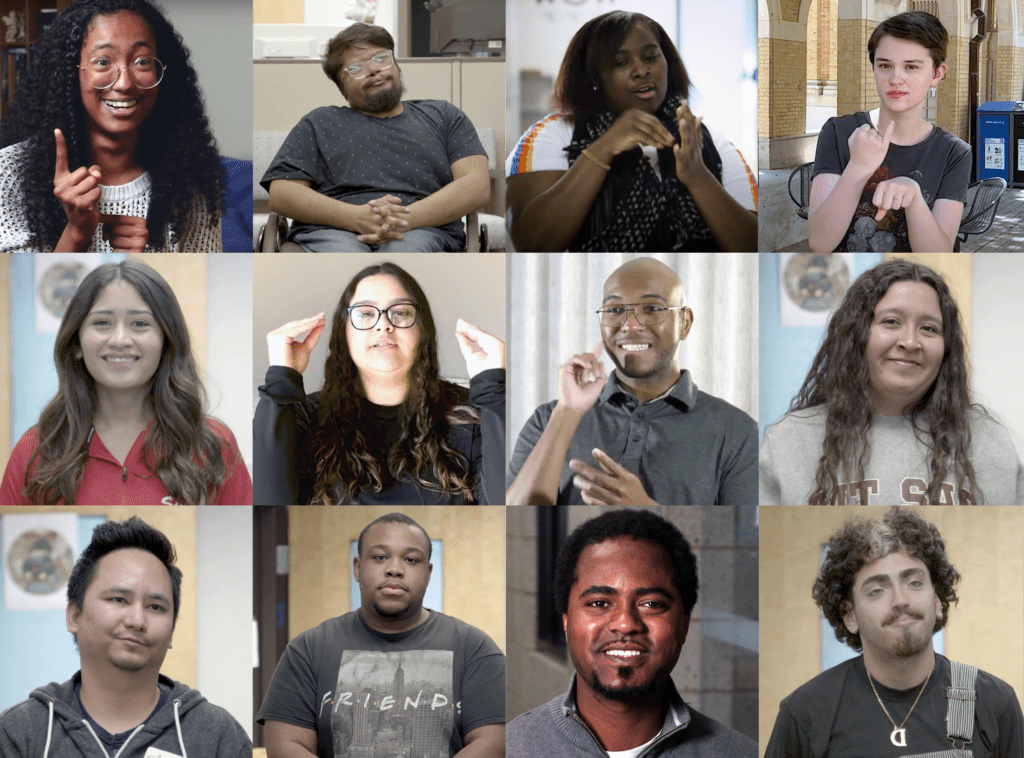Pre-Employment Transition Services (Pre-ETS)
Vocational Rehabilitation (VR) agencies have made the transition from high school to vocational training, college, and the workforce a priority for students with disabilities, including deaf youth. The Workforce Innovation and Opportunity Act (WIOA) requires that at least 15% of each state VR agency’s federal budget be reserved and expended to provide education and training […]
Rural Deaf Experiences: Employment and Educational Attainment Data

Our data indicate that employment and educational attainment differences persist between hearing and deaf people (Bloom et al., 2024). These differences are more significant in rural areas. Rural deaf people may experience unique and additional challenges, such as a lack of resources and tailored support services. For example, deaf people in rural areas are nearly […]
Making Online Learning Accessible for Deaf Students: A Guide for Disability Services

As of 2019, around 46% of deaf college students had taken online courses—almost half of all deaf students! Many educational activities also happen online, such as office hours, group projects, internships, conferences, or webinars. Deaf students can benefit from online learning in many ways, but thorough and proactive planning is needed for deaf students to experience the most […]
Graduate Student Resource Portal

Are you thinking about graduate school? Or maybe you’re about to start? If so, you’re not alone! More deaf students are enrolling in graduate programs each year. Getting a master’s degree or higher can help you earn more money and open up more career opportunities. On average, deaf people with a master’s degree or higher […]
Self-Determination
Since there are many barriers to postsecondary success, it is important that deaf students have an opportunity to practice and develop self-determination skills. For all students with disabilities, self-determination skills have been proven to be an important predictor of outcomes after high school. On this page, we share resources for parents, teachers, and transition specialists […]
How to File a Complaint
Getting effective accommodations should be a smooth process. You make the request, the accommodations are provided, and the accommodations work for you. But sometimes, the process is not smooth, and you don’t get what you need. As a deaf student, you have the right to file a complaint (sometimes called a grievance) if you do […]
Access, Belonging, and Affirmation

DPAIS 2022–2023 Authors: Jeffrey Levi Palmer, Carrie Lou Bloom, Lore Kinast, and Tia-Nikki Ivanko During the 2022–2023 academic year, NDC surveyed deaf students in higher education institutions across the nation. This report provides a comprehensive overview of survey results and offers suggestions for improving access and participation for deaf students on campus.https://www.youtube.com/watch?v=Vw4I-rOozAc Deaf College Students […]
Sustainable Recruitment and Retention Strategies for Sign Language Interpreters & Captionists
Ensuring equitable and accessible experiences in education and training settings for deaf people includes having a qualified pool of providers. Since the COVID-19 pandemic, colleges have been experiencing provider shortages, as well as, struggling to recruit and retain qualified providers. Knowing this, there are still many opportunities to grow and maintain provider pools. Whether you […]
Protected: Remote Speech-to-Text Services

There is no excerpt because this is a protected post.
Video Remote Interpreting
Video Remote Interpreting (VRI) is a service used when the interpreter and the deaf person are in different locations. Using high-speed internet and either software or web-based platforms, the interpreter can access consumers via video and audio feeds. People can then communicate with the interpreter via their own devices, such as a laptop, tablet, or […]
Why Captioned Media Provides Equal Access
Captioning of audiovisual media not only provides essential access for deaf people, but can also benefit emerging readers, visual learners, people with auditory processing issues, non-native speakers, and many others. Captions are the textual representation of audio content in a video format. Captions convey who is speaking, environmental sounds, and spoken dialogue. Can Other Accommodations […]
Interpreters as a Reasonable Accommodation for Testing
Is Providing an ASL Interpreter for Testing an Appropriate Accommodation? It depends on the purpose of the test, assignment, or other activity; the type and complexity of the course content; and the student’s language proficiency and academic experience. For example, while it can be appropriate to offer ASL interpretation for a history test where the […]





